Zumba: How a missing tape launched a global craze
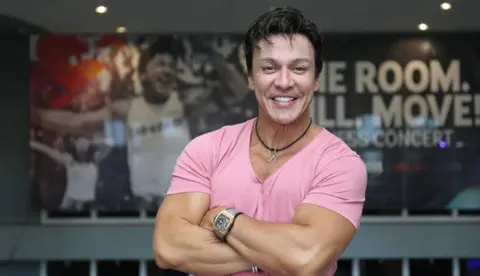 Zumba
ZumbaThe BBC's weekly The Boss series profiles different business leaders from around the world. This week we speak to Beto Perez, co-founder of exercise class company Zumba Fitness.
When Beto Perez forgot something as a teenager, little did he know that it would set him on a path to co-owning a $500m (£400m) global business.
Back in 1986 in Colombia, Beto - then 16 - was teaching aerobics in his home city of Cali in the south west of the country.
He had to use his employer's chosen song list of hit US pop singles, including the likes of Madonna and Michael Jackson. But one day he mistakenly left the cassette at home. So he had to quickly think on his feet.
"I had no choice but to use a mix-tape that I had in my car, and improvise from there," says Beto, now 49.
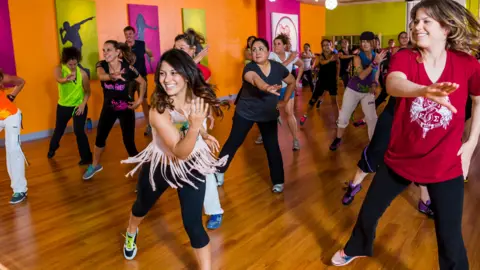 Zumba Fitness
Zumba FitnessThe tape he had in his vehicle was full of Latin songs, specifically salsa and merengue tunes that he had recorded from the radio. So he pretended to his students that he had planned a special class, and during the 30 minutes he improvised moves that worked with the music.
The class was an immediate hit, he says, with everyone having far more fun than usual. So he decided to stick with the Latin sounds and rhythms.
"It grew pretty quickly," he says. "Every time I taught, more and more people would show up and take a class. There would be lines out of the door of people waiting to get in. Word travelled fast. This was the beginning of Zumba."
From that start Beto eventually went on to launch his business Zumba Fitness. Today the Miami-based company is a household name with a reported 15 million people across 186 countries attending Zumba exercise classes every week.
The firm is worth at least a reported $500m, while Beto's personal fortune is estimated at $30m. It is a far cry from his impoverished childhood.
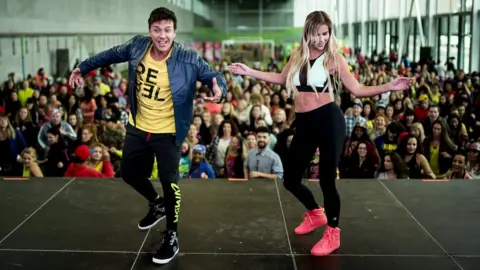 Getty Images
Getty ImagesBorn and raised in Cali, he started working when he was 14 to help his single mother. One year later she moved to the US on her own to start a new life. She emigrated after she was struck and injured by a stray bullet, and Beto wouldn't see her again for 10 years.
Initially he did a wide range of jobs; packing groceries, construction work, selling ice cream and working in a coffee shop. Yet his love was always music and dancing, and he became an aerobics teacher.
"The moment I watched Grease when I was eight, my passion for dance awakened," he says. "I grew up dancing in the streets and in the clubs to Latin music, but I also loved American dance."
As Beto's classes grew in popularity he moved to the Colombian capital Bogota, and further grew his following over the next 13 years. He was even hired by Colombian pop star Shakira to choreograph the dance moves for some of her songs. The name Zumba didn't exist at the time though, as he instead called his classes "rumba", meaning party.
Although Beto had made a success of his life in Colombia, he wanted to live the "American dream". So in 1999 he moved - illegally - to Miami. He said that the beginning of his life in the US wasn't easy because he didn't speak enough English and didn't bring enough money with him.
"I didn't know English fluently and was essentially alone," he says. "I slept on a park bench until I could move into my new apartment, so life was difficult."
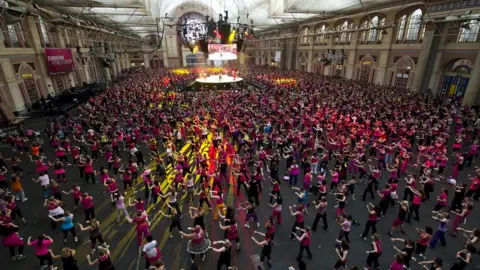 James McCauley
James McCauleyMatters improved though as soon as he started teaching his Latin music-fuelled exercise classes. "People loved it! It was so different to anything else that existed at the time," says Beto.
While his classes were full, he didn't have any idea that he could turn what he did into a wider business. Thankfully, one of his students introduced him to her son Alberto Perlman, and his friend Alberto Aghion.
Both Colombian Americans, they saw the commercial potential of what Beto was doing, and so the three went into business together. The brand name Zumba, a made-up word, was created in 2001.

More The Boss features:

The three men initially wanted to sell home fitness videos starring Beto. But short of cash, they had to be creative.
"We had no money!" says Beto. "We worked out of our apartment, and our first filming was done in Alberto Aghion's garage in front of a bedroom sheet."
Soon people started contacting them to know how they could become Zumba trained instructors, with 150 people signing up in 2003. This then rose to 700 a year later, and skyrocketed after that.
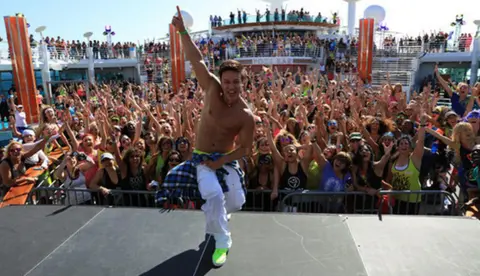 Zumba Fitness
Zumba FitnessToday Zumba has more than 100,000 instructors around the world. To get official certification each has to pay from $225 (£180) to do a training course. Instructors then have to pay a monthly fee of around $30, for which they receive continuing training, CDs, DVDs and choreography guidance.
With other revenue streams coming from clothing sales, music compilations and even computer games that allow users to practise their Zumba moves, the company's annual revenues are said to be in the hundreds of millions. The company won't reveal the exact figure though.
Entrepreneurship expert Jay Maharjan says that Zumba continues to be so popular because its "fun" and "health-conscious business model" has "transcended cultures and reached more than 180 countries".
Beto, whose job title is creative director, says that the company is continuing to expand, and is currently "growing at rapid speeds in countries like South Korea and Indonesia". He adds: "The global movement is truly stronger than ever."
